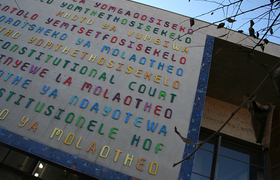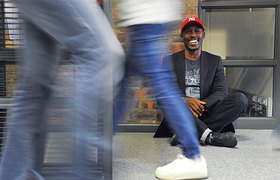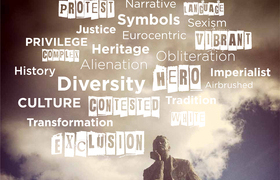Debate is a university's lifeblood
13 April 2015Prof Crain Soudien
Deputy Vice-Chancellor for Transformation
"One of the most critical features of the protest around the Rhodes statue has been the recurring critique of the students that the university has not heard and much less understood black pain. The students make the argument that this pain and the anger they feel about their pain can only be responded to by themselves in a way that they will define.
"The moment is poignant for the university. The university, structured as it traditionally and historically is around the ideal of deep understanding and the capacity to make sense, is having to explain itself and to provide guidance about how it will move forward beyond this moment. How should it, as a site that is fundamentally about working with extremely difficult questions, respond to this situation? How does it, in the face of black students' assessment that its history and its composition render it irrelevant, hold on to its own sense of legitimacy?
"The question can only be answered historically. The university has to say that its striving towards legitimacy is an ongoing one. It acknowledges its complicity with apartheid. Against this it has over the last 20 years taken the initiative in its teaching, its research and its socially engaged scholarship to respond to apartheid and its legacy effects. It has worked hard to develop modalities and approaches to the entry and flourishing of the poor and those who have been racially marginalised and the frameworks and languages for describing and making sense of the world. Has it arrived, however, at the point of the great task set for it by Cardinal Newman of being a place 'open to strangers from all quarters with knowledge from all quarters'? No, it has not. Such an acknowledgement importantly will allow it to ask questions about itself, about its capacity to recognise its blind spots and to recommit itself to openness.
"But, and this is critical for this period in which we find ourselves, what does it do after it has recognised that it has blind spots? What, for instance, does it do after working with the criticism of its Eurocentric nature? The only way open to it is to do that which it is committed to, that is to understand, in better ways. How does it do this? It does it by engaging in ceaseless discussion, debate, argument and counter-argument. It has no other tools. It cannot take recourse to fighting, to withdrawal, to the assertion of any power other than thought. Talking and talking and talking is its only source of legitimation. Anything else, and the university is no longer a university. It is something else."
|
|
 This work is licensed under a Creative Commons Attribution-NoDerivatives 4.0 International License.
This work is licensed under a Creative Commons Attribution-NoDerivatives 4.0 International License.
Please view the republishing articles page for more information.










